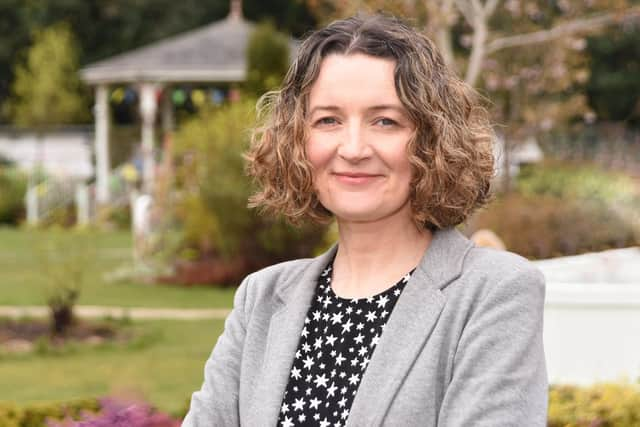Falkirk Council: Warning council tax will rise and services cut to balance books
and live on Freeview channel 276
Chief financial officer Amanda Templeman will tell members of Falkirk Council this week that the council faces an estimated budget gap of nearly £65 million over the next five years. While there are still many unknowns ahead, it looks very likely that Scottish Government funding will not increase.
At the same time, the council’s costs continue to soar as it faces massive energy and fuel bills, wages rise and inflation continues to be high. And in the wake of the pandemic and amid a cost-of-living crisis, demand for council services is also rising.
Advertisement
Hide AdAdvertisement
Hide AdThe Scottish Government’s funding is crucial as it makes up around 80 per cent of council funding. And on Wednesday, Ms Templeman and the council’s chief executive, Kenneth Lawrie, will present a financial strategy to councillors that sets out clearly how the council has no choice but to take drastic action on several fronts.


There are three main areas that the council can use to bridge the gap between income and expenditure: raising council tax, cutting services and increasing fees and charges. The harsh reality is that all three will have to come into play to meet the scale of the deficit, councillors are being told in no uncertain terms.
That £64.4 million budget gap assumes an increase in council tax of five per cent annually. This decision won’t be taken on Wednesday, but councillors are being warned it may well have to be higher.
If the council tax rise is any less than five per cent, more services will have to be cut or fees and charges increased, the report says. Likewise, if no service cuts can be agreed, council tax will have to rise even higher.
Advertisement
Hide AdAdvertisement
Hide AdThe report going to councillors makes bleak reading. But chief executive Kenneth Lawrie says that it is only by setting out clearly the scale of the challenge that a way forward can be found.
“Having that really robust five-year plan is important so that when elected members are taking decisions, be that about council tax or service savings or fees and charges, there is a really clear understanding about how these things relate to each other,” he said.
“If we want to preserve services, that does have an implication for what members do with council tax.”
Falkirk Council has one key tool it can use to manage the impact over the next five years – what it refers to as ‘service concessions’. Last year, the council was given longer to make repayments to its PFI schools, effectively meaning it had ‘overpaid’ by around £79 million.
Advertisement
Hide AdAdvertisement
Hide AdThis money is available to use to ‘smooth over’ the impact of drastic cuts. But Mr Lawrie says that the service concessions cannot be used to simply sustain services, as that just pushes the deficit to another year.
The chief executive is confident that councillors will back the financial strategy he is putting forward. And he says that the council has made good progress in many ways over the past year: the strategic property review is now well underway, huge changes to have been made to waste services; library services have also been reviewed.
Millions have also been saved through recruitment freezes and ‘efficiencies’ being made by individual departments. The chief executive acknowledges that the savings required will inevitably mean job losses, although he hopes they will be voluntary.
But there are many more big decisions looming for councillors, some of which have already been deferred, including the plan to save £1 million a year by scrapping the entitlement to free bus travel for around 1000 school pupils. In a separate report, council officers have told members that they believe this is the “least worst” option on the table.
Advertisement
Hide AdAdvertisement
Hide AdMr Lawrie said: “It’s really difficult for members to take decisions in the short term, but if they are delayed then it simply means that service concessions will be used up to bridge the gap and we won’t have any left to invest in new services, new facilities, new provision.”
The council leader, Councillor Cecil Meiklejohn, added: “The financial strategy will not negate the need for difficult decisions.
“But if we want to plan for the future then some of those decisions will have to be taken as early as possible and that would enable us to be able to use the service concessions within our communities.”
Officers have already warned councillors that if the changes are not made there is “a risk that the Scottish Government would appoint external advisers to take over leadership of the organisation”.
Advertisement
Hide AdAdvertisement
Hide AdMr Lawrie believes the financial strategy he is putting forward will stop that happening. He said: “At this stage it is not a likely scenario for Falkirk, we clearly understand the challenge we face and are bringing forward options.
“The warning, quite starkly stated in that report, is that if we don’t take difficult decisions then that is the position we would get to.”
“The worst case scenario is that if we don’t take some of the challenging decisions then a few years down the line we come to a cliff edge. And if we end up in that cliff edge position, we’ll have to take very rapid decisions that will impact significantly and very quickly on service provision and staffing.”
Falkirk Council meets in Grangemouth Community Education Centre, Abbots Road, Grangemouth on Wednesday (Sept 27) at 10 am. The meeting will also be livestreamed.